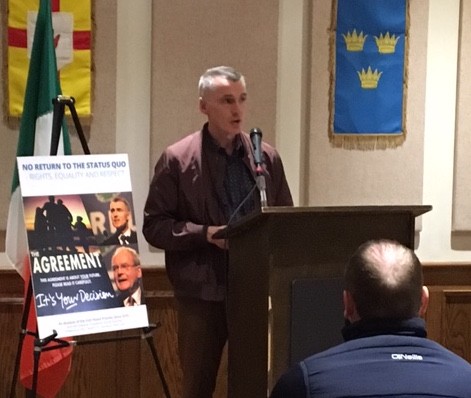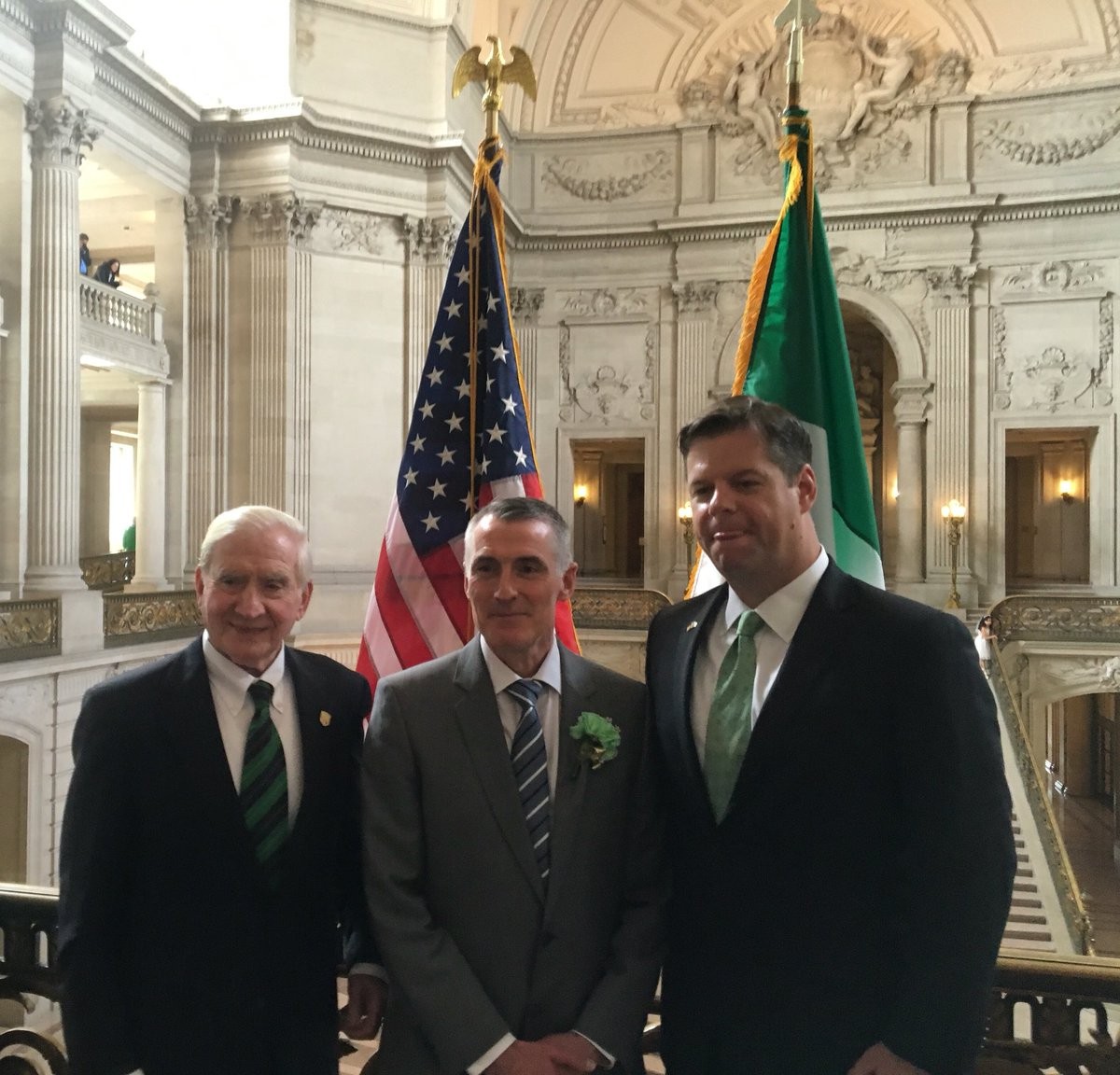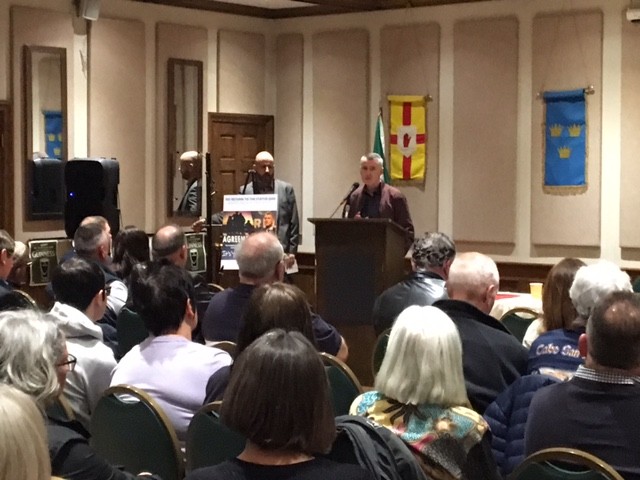16 March 2018
Irish America must re-mobilise in defence of the Good Friday Agreement

Irish Americans need to be launching new campaign initiatives within and beyond the diaspora. They need to be energetically lobbying US politicians and the Administration itself to become more engaged and interventionist in defence of the GFA, and in opposition to the negative repercussions of Brexit.
Last week I travelled to San Francisco at the invitation of the Campaign for a United Ireland.
Just a few days before my departure date I realised that my trip would coincide 30 years ago to the week with a tour I conducted on behalf of Sinn Féin across the US in 1988. That visit covered 17 cities, including San Francisco.
I left Dublin four days after the killings of Mairéad Farrell, Dan McCann and Seán Savage in Gibraltar. I remember watching the news coverage of the attack in Milltown cemetery on a TV in New Jersey: Otherwise I would have been in the middle of that killing field like thousands of others.
This was a long time before the Irish peace process was constructed. But it was only months before the Sinn Féin/SDLP talks were revealed, and which themselves became the first fragile foundations of the peace process.
Sinn Féin’s political strategy had long since before identified the strategic importance of North America, and the centrality of the Irish American diaspora to encouraging the US administration to adopt a progressive policy position towards the north of Ireland.
My role during that period in 1988 was to assess the potential within Irish America for maximising its political and publicity influence in support of democratic and national rights in Ireland.
It was a politically formative and educational experience, as I engaged with many different organisations and personalities, and also came to appreciate both the diversity of Irish America, and complexity of US politics and society.
Throughout that tour my accommodation, keep and morale depended upon the good nature and generosity of many committed Irish Americans, who included, among others:
John and Jean Bryce in Albany; Pete Quinn of Tenafly; Ed Brady of Brewster; Michael Shanley in the Bronx; Mike McGinley in Queens; Paul Doris down in Philadelphia; Ciarán Staunton, then in Boston; as well as, Dan and Maria O’Rourke;
Seamus and Eileen Mettress; and Jack Kilroy from across the Mid-West.
Throughout Paul Murray, Gerry Coleman, Marshall Mooney and Liam Ryan were constant supports.
At that time on the west coast Ginny and Cece Oakes anchored San Diego; and San Francisco was synonymous with Dan McCormick, the young people in the Ulster Gaelic Club, and Gerry Boyle.
.jpg)
Irish America has always been vital to Ireland’s independence struggle, especially all during the 19th and 20th centuries.
With the onset of the Civil Rights Movement in the north 50 years ago, Irish Americans organised solidarity and support. Later when the war began Irish American generosity directly assisted families on the breadline, helped fund internees’ and POWs’ food parcels, and made a difference to children’s lives.
In 1988 I quickly recognised how much untapped political potential and good will still existed within Irish America, and also other important sections of progressive American opinion.
Sinn Féin began proactively emphasising the importance of greater co-operation among Irish Americans. We encouraged key individuals and organisations to use their combined influence to exert leverage in pursuit of positive change in Ireland.
The success of the MacBride Principles campaign and the peace process itself were products of the new political and civic alliances which began to emerge.
Last week my first engagement in San Francisco was in the United Irish Cultural Centre to launch the booklet ‘No Return to the Status Quo’. En route to this event we picked up Gerry Boyle at his house – where I’d first met him just short of 30 years before.
There was a hint of nostalgia – but it was much more than that. You see, Gerry is now 89 years-old, but he's just as committed today as ever before. So it was a fitting honour that he was appointed Grand Marshall in the San Francisco St Patrick’s Day parade in 2016.
The book launch was a full house: The political engagement “full on”.
Nearly 6,000 miles from Ireland and the same issues were being raised by the audience: the lack of unionist leadership: Brexit: denial of citizen’s rights: Acht Gaeilge; the DUP/Tory alliance; the roles of northern nationalism and the Irish government.
I told the audience that the existing threat to the Good Friday Agreement (GFA) now demanded that the alliances which created it and the peace process were needed again to defend the GFA and citizens’ rights: And, that the huge influence of Irish America was central to these objectives.
I repeated that theme many times over during the following three days – in Sacramento with the Governor of California, Jerry Brown, and afterwards when I met the state legislative Irish caucus; with Irish American labour and community leaders; and then during meetings with San Francisco Mayor Mark Farrell, and, other members of the City Board of Supervisors.
Everyone I met grasped the gravity of the political crisis in the north. They understood the threat to the GFA, and instinctively got the catastrophe of Brexit.
The irrefutable strategic lesson to be learned about the north of Ireland from the period since 2010 particularly, is that the political and peace processes cannot be taken for granted.
This existing crisis is the combination of 20 years ‘push back’ against the GFA by political unionism.
The DUP specifically, is now emboldened in its opposition because it believes (correctly) that the British Tory government has its back. Brexit has also injected a new dangerous political and economic dynamic into the mix.
The DUP decision to pull away from the definitive accommodation and very advanced draft agreement arrived at with Sinn Féin on 14th February, raises fundamental issues about leadership authority, decision making, and commitment to genuine power sharing within that party.
These, and the increasingly extremist commentary from the Ulster Unionist Party, pose big questions about whether political unionism is capable of, or even wants to co-exist with the Irish cultural tradition and Irish nationalist/republican political identity in the north.
Only political unionism can answer these questions.
As the 20th anniversary of the GFA fast approaches the Agreement is being directly threatened by Brexit, British government policy towards the north, and the lack of leadership from within political unionism.
However, there is an unprecedented discontent among northern nationalist and progressive citizens.
Many are saying that it would be preferable to have the political institutions re-established on the correct terms, but 20 years after the signing of the GFA they are also asking if political unionism has squandered its chance to share power with Irish nationalists as equals.
The GFA is an internationally binding treaty. It has an international status that must be upheld.
But the political crisis is deepening.
It is not an option to stand back and spectate as a full-blown vacuum unfolds. That must be prevented.
Those who have invested so much in the peace process and vision of the GFA must act together.
British direct rule is not an option. That power is no longer available to the British government.
Therefore the British and Irish governments should immediately convene the Inter-Governmental Conference to set out a political plan in the absence of functioning political institutions.
The Irish government, following its own lead on Brexit, and as a co-guarantor for the GFA must now exert maximum diplomatic political pressure upon the British Government to have it declare unequivocally for the GFA and the delivery of equality and citizens’ rights in the North.
That should also extend to an immediate release of legacy inquest funds; the commencement of the legacy bill consultation (minus reference to a statute of limitations); and the removal of its national security veto on maximum information disclosure.
The influence of Irish Americans is now once more essential to entrench and defend the peace process.

Irish Americans need to be launching new campaign initiatives within and beyond the diaspora. They need to be energetically lobbying US politicians and the Administration itself to become more engaged and interventionist in defence of the GFA, and in opposition to the negative repercussions of Brexit.
This is a crucial juncture for the Irish peace process and future of the GFA.
The political advances of the last 20 years must not be allowed to be reversed or squandered.
We have arrived at an historic crossroads. Political unionism needs to make up its mind which side of history it wants to be on.
Those opposed to citizens’ rights, equality, genuine power sharing and partnership should not be allowed to prevail.
The future of the peace process and GFA requires Irish Americans to once again refocus and remobilise their significant political and civic influence across the United States.




